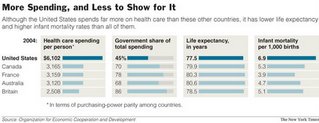Ezra has a post on single-payer health care with this interesting table (click on it to make it clearer):

A quick scan of the numbers tells you that the United States spends a whole lot more on health care than the other countries that are listed and has worse health outcomes in terms of such rough measures as life expectancy and infant mortality rates. It also has the smallest public sector share in health care finance.
One likely conclusion to draw from these numbers is that the U.S. health care system is not performing very well and that one possible reason for this is the market-based system so overwhelmingly preferred here. But a few cautions are in order.
First, the measures of life expectancy and infant mortality rates are not specific measures of how well the health care system is performing. They are measures of general health in the crudest possible form of its absence: the timing of death, and the reasons for death are not only in the availability of medical care.
Life expectancy, for example, is very sensitive to anything that causes people to die at fairly young ages. The greater rates of traffic accidents and violence in the U.S. may explain most of the life expectancy differences, and there isn't terribly much the health care system can do about preventing those.
Infant mortality rates are a better measure of the performance of the health care system in general, because they have been shown to be highly sensitive to early medical intervention. But the U.S. rates are not so high generally. The high rates are caused by high black infant mortality rates, and the figure may tell us more about racial inequality than about the overall health care system. It could be that reallocating the current spending so as to favor certain fields of medicine and poorer areas would do more to reduce these rates than changing the whole system. Or perhaps not, but it's important to understand that we are dealing with very crude measures of performance here.
Second, what the health care system produces is not just improvements in life expectancy or delayed dates of death. Much of the product has to do with caring for individuals and with attempts to improve their general quality of life. These kinds of measures are absent in the above table of comparisons.
Third, the United States is one of the major producers of medical innovations and new interventions. This is an expensive endeavor and one which benefits the other countries in the longer run. Its costs are partly reflected in the higher health care expenditures.
Now, none of these points are made to argue that the initial conclusion would be false. The U.S. health care system performs poorly in several areas and the number of uninsured Americans is a disgrace. We could probably improve the life expectancy and infant mortality figures through a more rational health care system, but I suspect that that alone would not completely neutralize the kinds of comparisons the table presents.
----
Via Eschaton